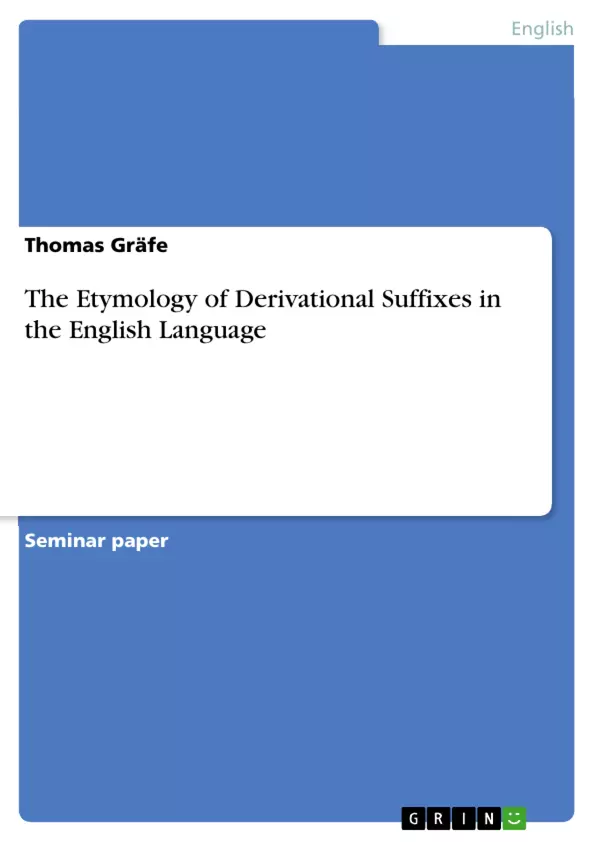Die Arbeit untersucht die Etymologie von derivational suffixes in der englischen Sprache auf der Grundlage eines Korpus von 70 Suffixen.
Table of Contents
- I. Introduction
- II. Suffixes, derivation and etymology: some definitions and examples
- III. Table of derivational suffixes
- IV. Interpretation and Conclusion
Objectives and Key Themes
This paper investigates the etymology of derivational suffixes in English, aiming to understand how changes in word formation patterns are reflected in the history of these suffixes. It analyzes a list of 70 derivational suffixes, examining their etymology, semantics, and patterns of formation to draw general conclusions about changes in word-formation processes.
- Etymology of derivational suffixes
- Changes in word formation patterns
- The distinction between derivation and compounding
- The development of suffixes from free to bound morphemes
- The semantic and grammatical impact of suffixes
Chapter Summaries
I. Introduction: This introductory chapter sets the stage for the paper by defining key terms like etymology, morpheme, derivation, and compounding. It highlights the dynamic nature of language, emphasizing that word formation processes are constantly evolving due to internal linguistic changes, language contact, and socio-cultural influences. The chapter establishes the paper's focus on the etymology of derivational suffixes, outlining the methodology: an analysis of a list of 70 suffixes to draw conclusions about broader changes in word formation. The introduction foreshadows the detailed examination of derivation versus compounding in subsequent sections.
II. Suffixes, derivation and etymology: some definitions and examples: This chapter delves into precise definitions of "suffix," "derivation," and related concepts. It differentiates between derivational and grammatical suffixes, illustrating how derivational suffixes can change the syntactic category and semantic meaning of a word, unlike grammatical suffixes. The chapter critically analyzes the often-blurred line between derivation and compounding, exploring various types of compounds (e.g., parasynthetic, neo-classical) and illustrating how some suffixes originated as independent words that later became bound morphemes, such as "-dom" and "-hood." This careful distinction lays the groundwork for the analysis of suffixes' etymological development.
Keywords
Etymology, derivational suffixes, word formation, compounding, morphemes, bound morphemes, free morphemes, semantics, grammatical categories, English language, historical linguistics.
Frequently Asked Questions: A Comprehensive Language Preview
What is the main topic of this language preview?
This preview explores the etymology of derivational suffixes in English, examining how changes in word formation patterns are reflected in their historical development. It analyzes 70 derivational suffixes, investigating their origins, meanings, and formation patterns to understand broader shifts in word-formation processes.
What are the key themes covered in this preview?
Key themes include the etymology of derivational suffixes, changes in word formation patterns over time, the distinction between derivation and compounding, the evolution of suffixes from free to bound morphemes, and the semantic and grammatical impact of suffixes.
What is the structure of the preview?
The preview is structured into four chapters: an introduction defining key terms and outlining the methodology; a chapter detailing definitions and examples of suffixes, derivation, and etymology; a table of derivational suffixes (not shown in this preview); and a concluding chapter summarizing the findings.
What is the methodology used in this analysis?
The analysis involves a detailed examination of 70 derivational suffixes. Their etymologies are traced, their semantic contributions analyzed, and their patterns of formation studied to identify trends and changes in English word formation over time.
How does the preview differentiate between derivation and compounding?
The preview carefully distinguishes between derivation (adding affixes to change a word's meaning or grammatical category) and compounding (combining two or more independent words). It explores how some suffixes originated as independent words that subsequently became bound morphemes, illustrating the blurry line between these two word-formation processes.
What is the significance of studying the etymology of derivational suffixes?
Studying the etymology of derivational suffixes allows us to understand the dynamic nature of language and how word formation processes evolve due to internal linguistic changes, language contact, and socio-cultural influences. It provides insights into the historical development of the English language.
What are some examples of key terms defined in the preview?
Key terms defined include etymology, morpheme, derivation, compounding, derivational suffixes, grammatical suffixes, bound morphemes, free morphemes, and semantics.
What are the key conclusions foreshadowed in the preview?
The preview suggests that the analysis of the 70 suffixes will reveal broader conclusions about changes in word-formation processes in English, highlighting the dynamic and evolving nature of language.
What are the keywords associated with this preview?
Keywords include: Etymology, derivational suffixes, word formation, compounding, morphemes, bound morphemes, free morphemes, semantics, grammatical categories, English language, historical linguistics.
- Quote paper
- Thomas Gräfe (Author), 2001, The Etymology of Derivational Suffixes in the English Language, Munich, GRIN Verlag, https://www.grin.com/document/136734



